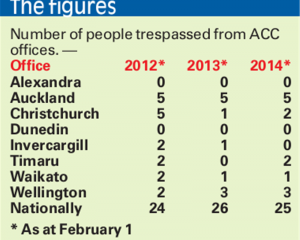Two important announcements by the Government last week were overshadowed by the environmental disaster unfolding in the Bay of Plenty.
Nevertheless, the effects of the two changes, announced by Finance Minister Bill English and ACC Minister Nick Smith, are important for New Zealanders, particularly their longer term consequences - which will be intergenerational.
Mr English trebled the Earthquake Commission levy that insured homeowners will pay from February 1 next year.
The increase will rise from 5c for every $100 insured to 15c for every $100.
While that may not seem like much, it increases the maximum amount to be paid by insured homeowners from about $70 to almost $210 a year.
A day later, Dr Smith substantially reduced ACC levies for wage and salary earners, employers and the self-employed.
The reductions were possible because of ACC declaring a healthy surplus of $3.5 billion.
It is hard to ignore the nice juxtaposition of the announcements.
Mr English announces bad news on one day, followed by Dr Smith easing the pain the next.
Given the nation is captivated by an oil spill in the Bay of Plenty, and the prospects of the All Blacks winning the Rugby World Cup, any comment on those two announcements has been limited.
Mr English has continually ruled out an earthquake tax - a tax on income - for all New Zealanders to help rebuild Christchurch.
He claims that an earthquake tax would not be fair on taxpayers who did not own a house or have insurance.
The Government believed it was better for insured homeowners, who directly benefit from the commission's cover, to pay those costs through a levy.
In addition, raising income tax would have a negative effect on economic growth.
It is difficult to follow Mr English's logic, but Cabinet's thinking seems to be that it is better to replenish the coffers of the commission through an increased levy than imposing a tax.
Even with the increased payments, it will take about 30 years to rebuild the fund back to pre-earthquake levels.
And to be fair, the commission's reserves mitigated the financial impacts of the quakes on the rest of New Zealand because the Government was not forced to borrow more than necessary for the rebuild.
National has made no secret of its desire to partially privatise ACC - again - and Dr Smith has already been accused of creating a false sense of crisis in the corporation to wear down the objections of many New Zealanders who feel secure in the knowledge that a no-faults policy exists in the event of their being injured at work or play.
The figures provided by Dr Smith are astounding.
The corporation has turned around losses of $2.4 billion in 2008 and $4.8 billion in 2009 to a surplus of $2.5 billion in 2010 and $3.5 billion this year.
The extra cash has come almost by accident - although the opposition did always contest Dr Smith and the National Party's conjecture that the corporation was going broke.
Cabinet, embarrassed by the new-found riches in ACC, was wary of going into an election facing questions about how much money was sitting in the earners' account.
When National made changes to ACC soon after it was elected to lead the Government in 2008, it made too many cuts and has been rewarded with an embarrassment of riches.
Cabinet took a decision to reduce the levies substantially and, fortuitously, the election is only six weeks away.
The collective smiles around the table at the decision to give away money was reward enough for Dr Smith.
While there is nothing to suggest there was collusion between Mr English announcing the bad news one day and Dr Smith providing some good news a day later, there will remain a general suspicion that ulterior motives lie behind the decisions of the Government.
Already, the proposal to sell portions of state-owned assets is on the election agenda.
It is not much of a leap to imagine a healthy balance sheet in the earners' account might attract the interest of private insurers keen to make money after their accounts were depleted from payouts to those with property damaged in Christchurch.





